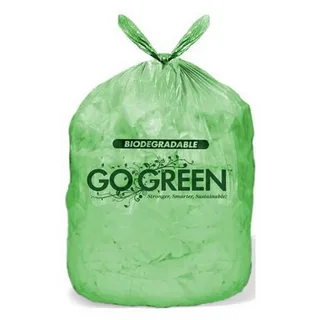Evolution of Waste Management And Biodegradable Garbage Bags
Introduction To Biodegradable Garbage bags :
In today’s world, the environmental impact of our daily choices is becoming increasingly significant. One area where this is particularly evident is in the use of plastic products, especially single-use items like garbage bags. However, as awareness of environmental issues grows, so does the demand for sustainable alternatives. One such alternative gaining popularity is biodegradable garbage bags. In this article, we’ll delve into the world of biodegradable garbage bags, exploring their significance, functionality, advantages, and even their role in packaging small cartons of milk.
Understanding the Importance of Biodegradability
Environmental Impact of Traditional Plastic Bags
Traditional plastic bags, often made from non-biodegradable materials like polyethylene, pose a serious threat to the environment. These bags can take hundreds of years to decompose, filling up landfills and oceans, and causing harm to wildlife in the process.
Role of Biodegradable Garbage Bags in Waste Management
Biodegradable garbage bags offer a solution to this problem. Made from organic materials that can break down naturally over time, these bags minimize environmental harm while still serving the purpose of waste containment.
How Biodegradable Garbage Bags Work
Materials Used in Production
Biodegradable garbage bags are typically made from plant-based materials such as cornstarch, vegetable oils, or recycled plastics. These materials are chosen for their ability to decompose quickly and safely.
Biodegradation Process Explained
Once disposed of, biodegradable garbage bags undergo a natural degradation process, breaking down into harmless substances like water, carbon dioxide, and biomass. This process is facilitated by microorganisms in the environment, such as bacteria and fungi.
Advantages of Using Biodegradable Garbage Bags
Reduced Environmental Footprint
By choosing biodegradable garbage bags over traditional plastic ones, individuals can significantly reduce their environmental footprint. These bags minimize pollution, conserve resources, and support sustainable waste management practices.
Contribution to Sustainable Living
Using biodegradable garbage bags aligns with the principles of sustainable living, promoting responsible consumption and disposal habits. It’s a small but meaningful step towards a more eco-friendly lifestyle.
If you want to know more Information about little cartons of milk visit TopUSAPackaging.
Comparison with Traditional Plastic Bags
Durability
While traditional plastic bags may be more durable, biodegradable options offer sufficient strength and reliability for most household waste disposal needs.
Cost-effectiveness
Although biodegradable garbage bags may be slightly more expensive than their plastic counterparts, their long-term environmental benefits often outweigh the initial cost difference.
Environmental Impact
In terms of environmental impact, biodegradable garbage bags are far superior to traditional plastic bags, as they pose minimal harm to ecosystems and wildlife.
Availability and Accessibility
Market Trends and Demand
The demand for biodegradable products, including garbage bags, has been steadily increasing in recent years, driven by growing environmental awareness and regulatory measures.
Accessibility in Different Regions
While biodegradable garbage bags may be readily available in some regions, accessibility can vary depending on factors such as local regulations and consumer demand. However, with increasing awareness, these products are becoming more widely accessible.
Proper Disposal and Composting
Guidelines for Disposal
To ensure effective biodegradation, it’s essential to dispose of biodegradable garbage bags properly. This may involve composting at home or utilizing municipal composting facilities where available.
Composting Benefits
Composting not only helps break down biodegradable waste but also produces nutrient-rich compost that can be used to enrich soil and promote plant growth, closing the loop on organic waste management.
Biodegradable Garbage Bags and Sustainable Packaging
Use in Packaging of Small Cartons of Milk
In addition to waste management, biodegradable garbage bags also play a role in sustainable packaging solutions. They can be used to package small cartons of milk and other perishable goods, offering an eco-friendly alternative to traditional plastic packaging.
Environmental Benefits in Packaging Industry
By embracing biodegradable materials in packaging, the industry can significantly reduce its environmental impact, mitigating pollution and resource depletion associated with conventional packaging materials.
Future Outlook and Innovations
Research and Development in Biodegradable Materials
Ongoing research and development efforts are focused on improving the performance and sustainability of biodegradable materials, paving the way for even more eco-friendly solutions in the future.
Potential for Biodegradable Packaging Solutions
The future holds great potential for biodegradable packaging solutions, with innovative technologies and sustainable practices driving the transition towards a circular economy.
Conclusion
Biodegradable garbage bags represent a significant advancement in waste management and sustainable living. By choosing these eco-friendly alternatives, individuals can minimize their environmental impact and contribute to a cleaner, healthier planet.



